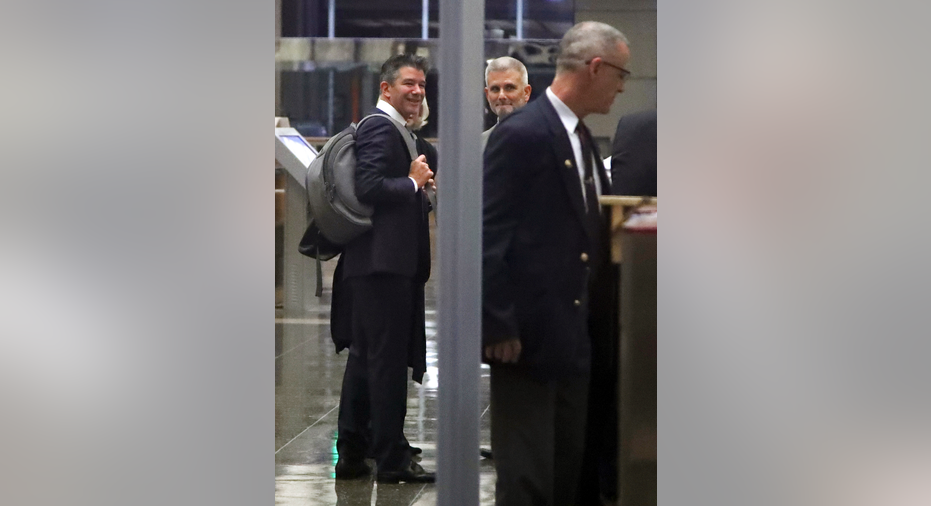Ex-Uber CEO weaves tale of Google betrayal in legal battle

SAN FRANCISCO – Former Uber CEO Travis Kalanick was confronted Wednesday in court with old texts that suggested he was willing to go to any length to surpass a Google self-driving car project.
Kalanick was on the witness stand for a second day to answer allegations that he teamed up with former Google engineer Anthony Levandowski to rip off self-driving car technology now owned by Waymo, a Google spinoff.
In one February 2016 text, Kalanick agreed with a comment by Levandowski that "second place is first looser (sic)." Another text included a link to a video clip from the 1987 movie "Wall Street" that is popularly known as the "Greed is good" speech.
In a later text, Levandowski told Kalanick, "we do need to think through the strategy to take all the shortcuts we can find."
Waymo alleges that Levandowski heisted eight trade secrets from Google before leaving the company in January 2016. He founded his own startup, Otto, which Uber bought a few months later for $680 million. Kalanick has acknowledged discussing plans for Otto with Levandowski before he started it, though both he and Uber deny they ever used any Google technology to build a fleet of self-driving cars.
Kalanick didn't deny any of the exchanges, although he didn't recall some of them. He had little to say about the texts, other than his recollection that he originally heard his high school football coach say, "second place is first loser."
After a Waymo lawyer finished grilling him, Kalanick turned to a more emotional tale under friendly questioning from an Uber attorney, casting himself as a "little brother" betrayed by an older and more powerful sibling. Uber and Google were once partners, although their interests later began to collide, souring the business relationship.
Kalanick recalled that Uber only had a few hundred employees in the summer of 2013 when Google was negotiating to make a major investment in the ride-hailing service. He remembered thinking it was "cool" when Google sent over one of its self-driving cars to pick him up and drive over to meet with then Google CEO Larry Page (now CEO of Google's corporate parent, Alphabet Inc.)
"It was kind of like little brother with big brother," Kalanick described his relationship with Page, 44, who co-founded Google in a Silicon Valley garage in 1998. That was 11 years before Kalanick, 41, started Uber.
After Google invested in Uber, Kalanick testified, the plan was for Uber to eventually deploy Google's self-driving cars in its ride-hailing service. "Google was a huge partner of ours," he said. "It was a great relationship."
But things began to change in 2014 when Kalanick heard rumors that Google intended to challenge Uber with its own ride-hailing service. That testimony is supported by internal Google documents already displayed in the trial showing plans to "consume" all of Uber's profits by 2025.
Kalanick testified that he tried to contact Page about the rumors, only to be given the cold shoulder. Convinced that Google was going its own way, Kalanick decided to start a self-driving car division within Uber by hiring top engineers specializing in robotics from Carnegie-Mellon University in Pittsburgh in 2015.
That move incensed Page, Kalanick testified. "Larry was very upset that we were doing his thing," Kalanick said. Page is expected to testify later in the trial.
Dissatisfied with the progress that the engineers imported from Carnegie-Mellon, Kalanick began looking for other talent in late 2015. That spawned his discussions with Levandowski, a respected expert in self-driving vehicles who had become disillusioned with the direction of Google's project.
What happened next lies at the heart of the trial. Waymo alleges Kalanick and Levandowski cooked up a plan for Levandowski to launch his startup as a storehouse for Google trade secrets that would later be transferred to Uber. Kalanick says he simply found a way to bring Levandowski and his vast knowledge to Uber.
"We hired Anthony because we thought he was incredibly visionary," said Kalanick, who also described Levandowski as "very charming."
Uber wound up firing Levandowski last May after he refused to relinquish his constitutional rights against self-incrimination when questioned about whether he stole trade secrets before leaving Google.
Kalanick was pressured by investors to step down as CEO a month after Levandowski's firing, partly because of concerns about Waymo's lawsuit. "This (case) makes it not as great as we thought it was in the beginning," Kalanick said of the deal that brought Levandowski to Uber.



















